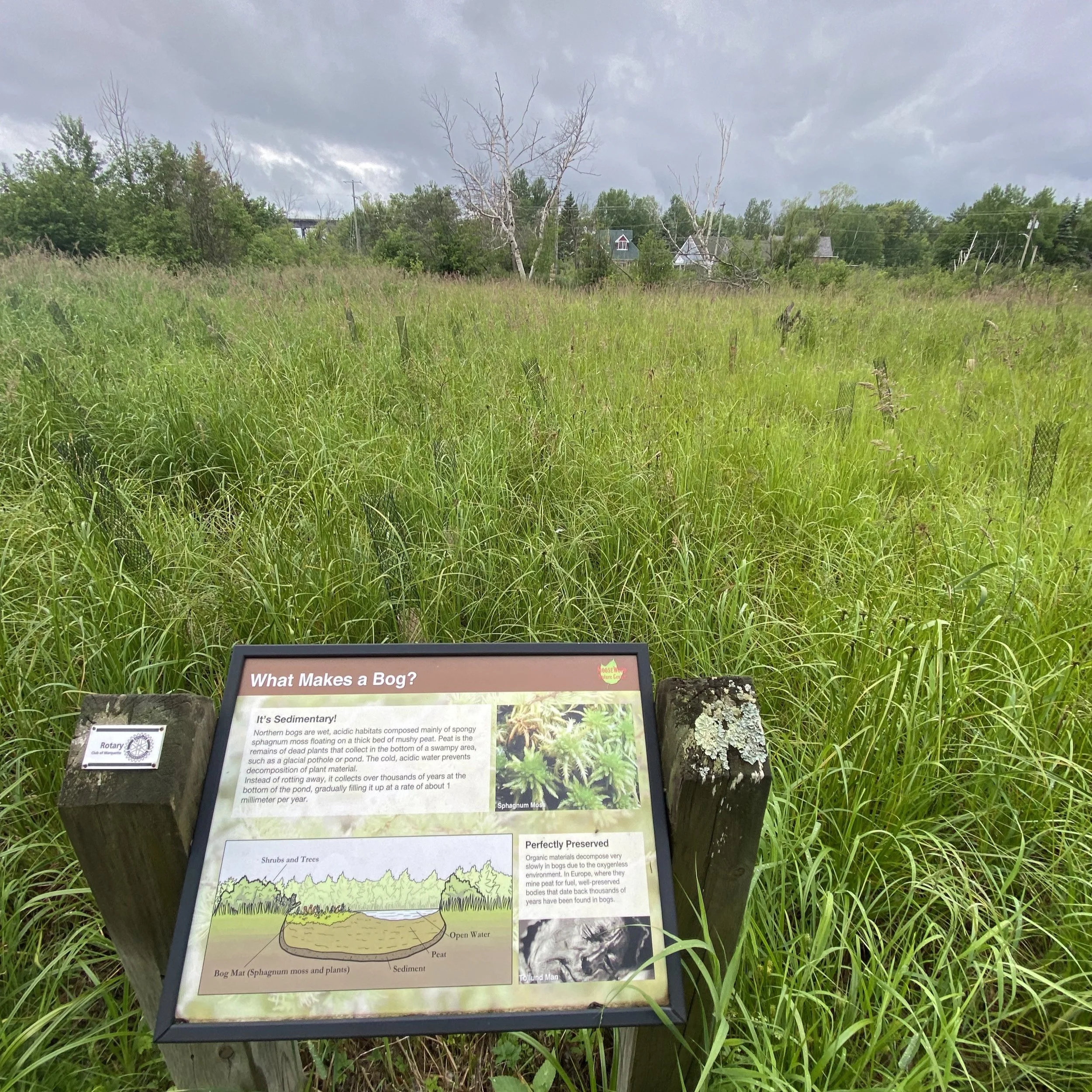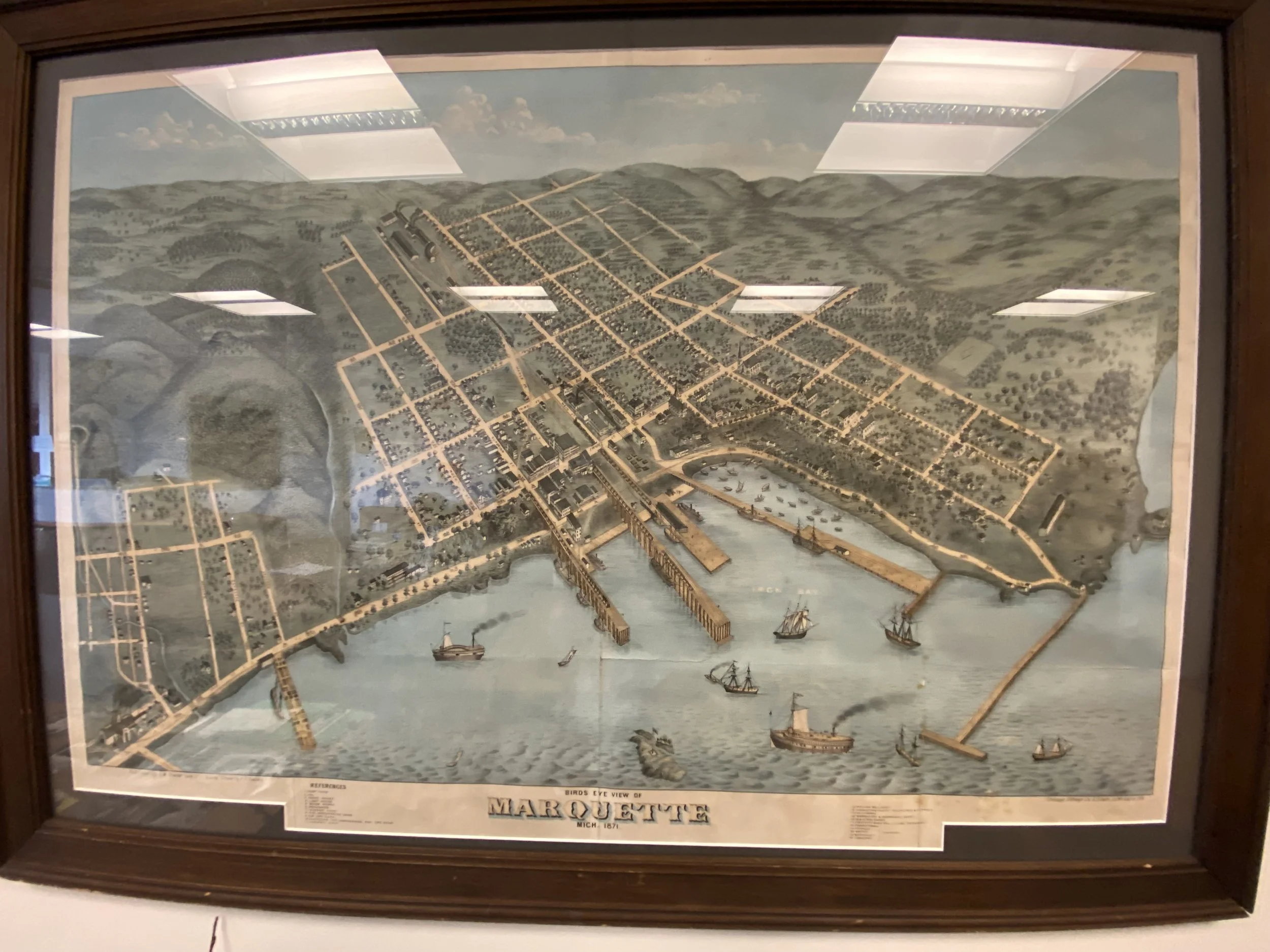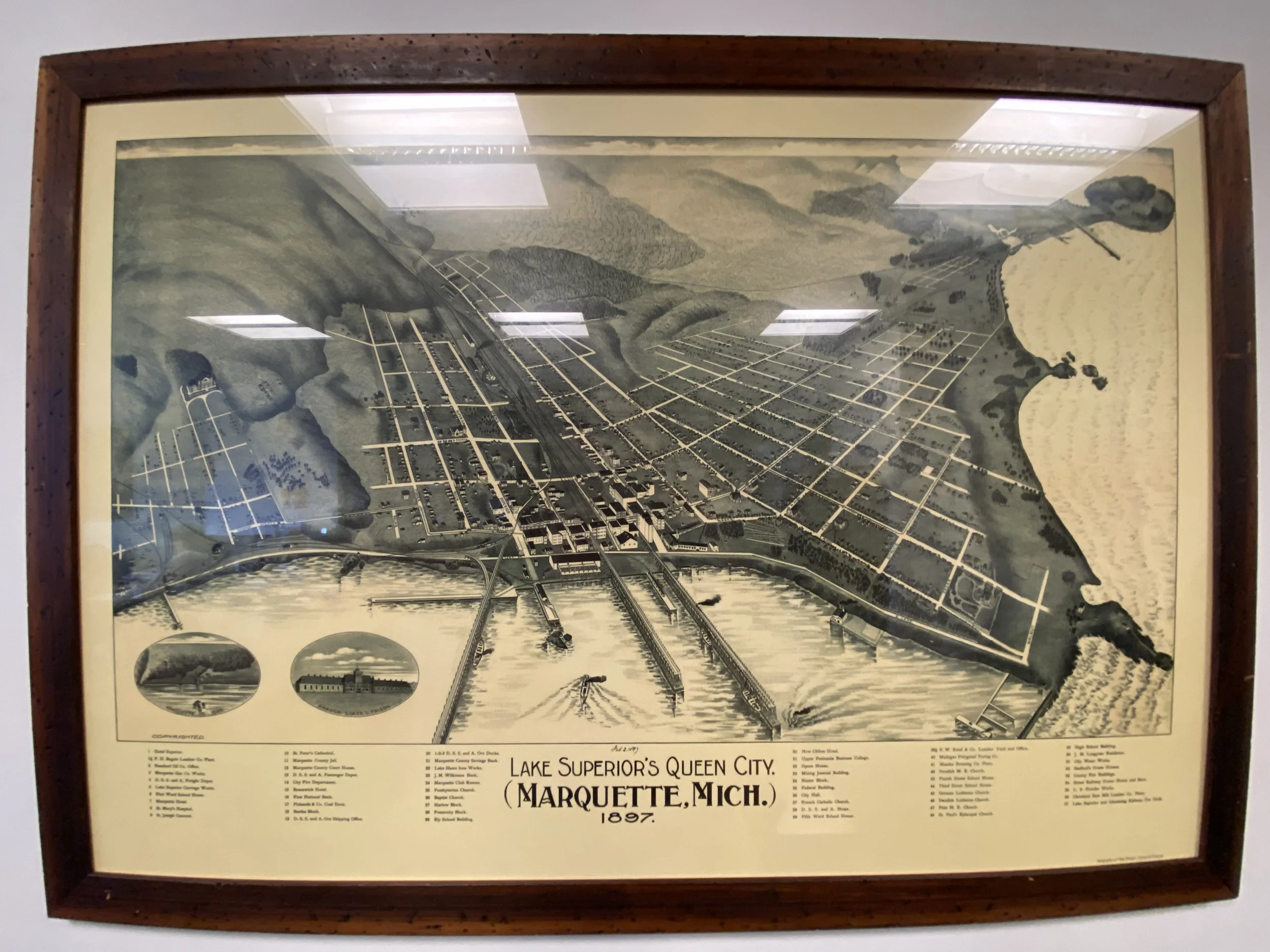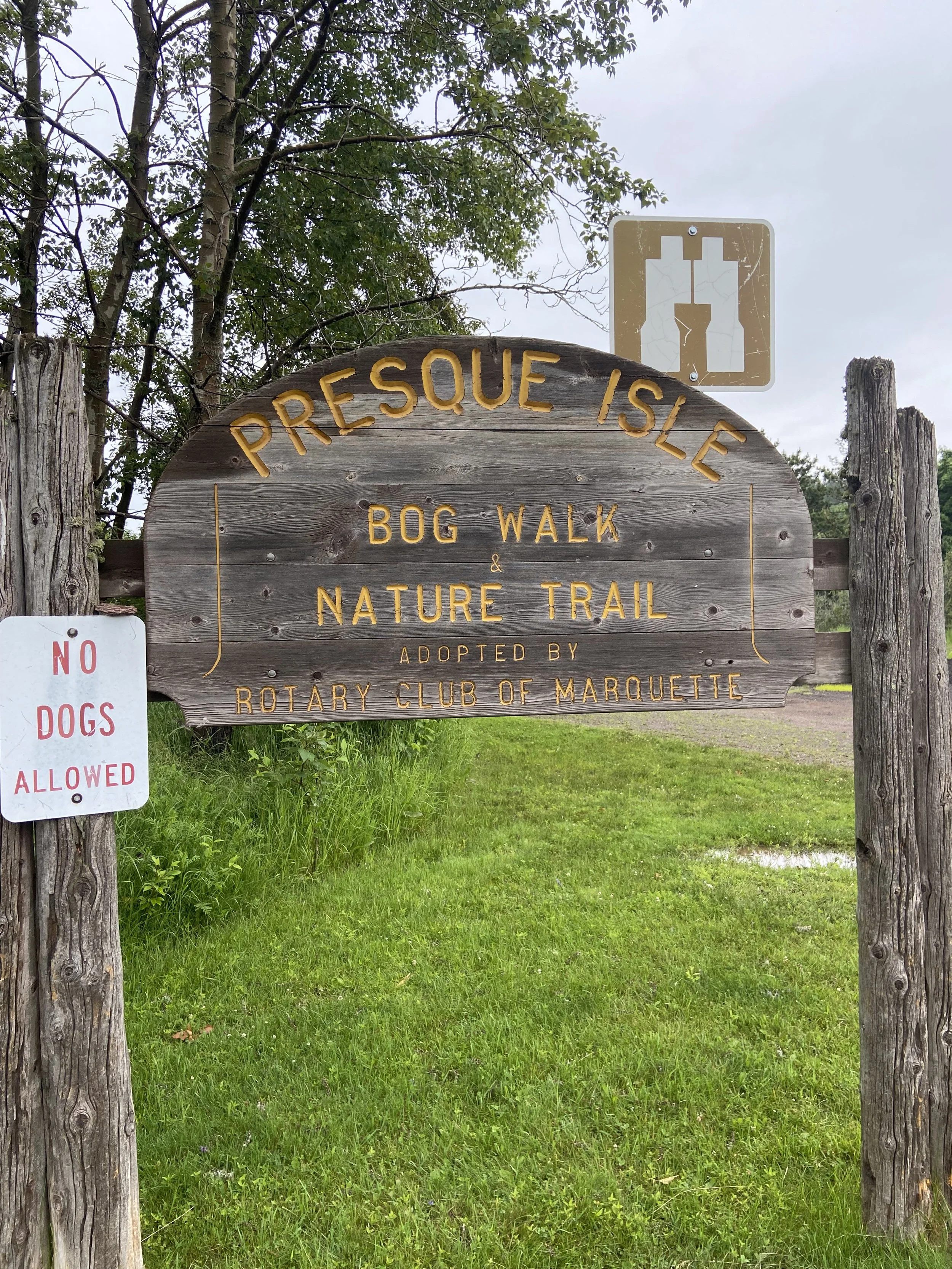almost island almost never
If you have ever had the joy to travel in the Upper Peninsula of Michigan you may have stopped in city nestled along the shoreline of Lake Superior, the city of Marquette. Along fresh water coast there is an island…well, almost an island… a beautiful spot called Presque Isle (Presque Isle literally means “almost an island”).
Maybe you’ve stopped there before and jumped off of the Black Rocks, or strolled along the bog walk, or driven around and looked for deer…or a woodchuck (I’ve seen one before). It’s a wonderful gem of a place, and Marquette is fortunate to have it as part of its city parks, but not many people know that a little over a hundred years ago this lovely piece of land might not have ever been part of the city.
Last week I was able to spend the Fourth of July and some extra days in Marquette, my old stomping grounds, and as part of my sabbatical research meet with Carl Wozniak, part of the team that runs the Moosewood Nature Center, an educational facility that is located on Presque Isle.
I like to think of Moosewood as ambassadors to the many visitors that come to Presque Isle, or simply called “the Island” by many locals. Guests and residents are sure to see flora and fauna that they may be unfamiliar with, and Moosewood can help them to identify, understand, and protect this wild life.
Over the years there has been many changes to what the Parks department has done on Presque Isle. When I was a wee lad in the 1980s there was a zoo on the Island that had peacocks, bear, cougars, and so many deer. I remember being able to put a dime in a gum ball machine that dispensed corn kernels and feeding the deer through the chain link fence. After some years the zoo was taken down and the fences removed. Many of the animals were relocated, but the deer themselves were simply set free to roam to Island. For awhile I remember you could drive around and roll down your window and a deer might approach you looking for a handout.
In the 1990s there was a small water park on Presque Isle; a pool, diving board, and water slide. If you ever swam there, however, you will recall a very slick algae along the bottom of that pool, fed by a copious amount goose poop. It was…gross. Needless to say, the idea of the waterpark was short lived and today the pool area has been turned into a wetland bog walk and the old pool house is actually where the Moosewood Nature Center is housed.
One of the educational displays in the bog walk on Presque Isle
One of the struggles that Moosewood faces, that almost any organization faces, is funding. They are operated by the City, but do not receive funding from the City, or the County, or the State… instead they are financially supported through grants and independent donors. This is enough to keep things operational, but limits expanding their operations. I had asked Carl about the possibility of Presque Isle ever leaving the city’s jurisdiction and becoming a State Park or National Park (Coastal) and thus receiving a bigger piece of tax revenue. His answer was surprising to me. It led me down a research trail I had not anticipated that day. Carl said that there was some very specific legal parameters around Presque Isle, that it could only ever be a park, and that that park could only belong to the City. He had said that this was put in place in the 1800s and was somewhat novel for its time.
I had never heard that before, and I had grown up in the U.P. This idea that a piece of land was protected, to be a park, in such a legal way… well, I had to know more. You see, in the project of Redeem Mi Land there is always this component of how to protect a piece of land for ongoing generations. How do you redeem a piece of land and then ensure it’s safety from the very thing that harmed it in the first place? If we wanted to continue to metaphor of Redeem Mi Land and our lives, we could think of this like “Perseverance of the Saints” or in the words of John 10:28 “I give them eternal life, and they will never perish, and no one will snatch them out of my hand.” or Romans 8:38-39 “For I am sure that neither death nor life, nor angels nor rulers, nor things present nor things to come, nor powers, nor height nor depth, nor anything else in all creation, will be able to separate us from the love of God in Christ Jesus our Lord.”
So where does one go to find legal documents pertaining to local land dating back to the 1800s? To the library, of course! And in Marquette, the library at hand is the Peter White Public Library…a great place for book lovers if you are ever in the downtown area. I have to give an applause to the staff in the non-fiction area, they know their stuff. When I came in and bumbled through what I was looking for… “some document that deeded Presque Isle to the city, from whom? I don’t know? And it spells out what it can and can’t be….and it’s from the 1800s…” They were not phased, in fact, they were excited to help me find what I was looking for.
It was through a few articles and books about Presque Isle that I eventually found another clue. Apparently, in the 1880s, while Marquette barely 30 years a city, the land known as Presque Isle was not owned by the City, but was owned by the Federal Government. Jutting out into Lake Superior the Island was reserved for a future light-house, a very practical thing for shipping on a lake known to take down a ship or two (or more than 500!). But despite its deed being held by the U.S. Government, a local resident, philanthropist, and civil servant named Peter White (Yes, the same as the library was named after) saw this piece of land as something of great value, not for its utilitarian purpose, but for its natural beauty, and sought save it for the City.
Peter White, who was the chair of the Parks and Cemeteries Commission for the City, made trips to Washington DC to convince the White House to deed the land to Marquette. At the time, this was unheard of, and he was given many “No’s” from the politicians. When he went before the light-house board they couldn’t comprehend the land being anything other than that for a light-house. The local congressman, Moffatt, had said “It can’t be done.” Peter White then went before the Committee on Public Lands of the House and this group said “Can’t do it.”… but Peter White asked them that IF the Senate were to pass it, would they approve? So the Committee, thinking that there would be no way the Senate would pass any bill that set such a new precedent, agreed to this request. Peter White then went before some Senators and was able to convince them to get his bill on the floor.
On July 12th, 1886 the records of the 49th Congress (Session I, Chapter 765) show that the almost 400 acres of land known as Presque Isle is deeded to the city of Marquette, reserving only a small strip (1 acre) for a potential future light-house. Within the verbiage of the bill are the stipulations that if the land is ever used as anything but a park, that it shall then revert back to Federal ownership… and thus, Presque Isle is protected as a park from any would be developers or otherwise. The City of Marquette was entrusted with its care and preservation.
Marquette 1871, notice where the map cuts off in top right corner.
Marquette, 1897…notice what has been included in top right corner
As land and projects are sought and implemented by Redeem Mi Land, it will be important to remember that there are laws that can be used to protect lands into the future. Each project will have its own unique challenges and jurisdictions, but even if a “no” is the initial answer given, perhaps we can be encouraged by the tenacity of Peter White and Presque Isle…the “Almost Island” that almost wasn’t part of Marquette’s heritage.
to learn more about Moosewood Nature Center visit their website





